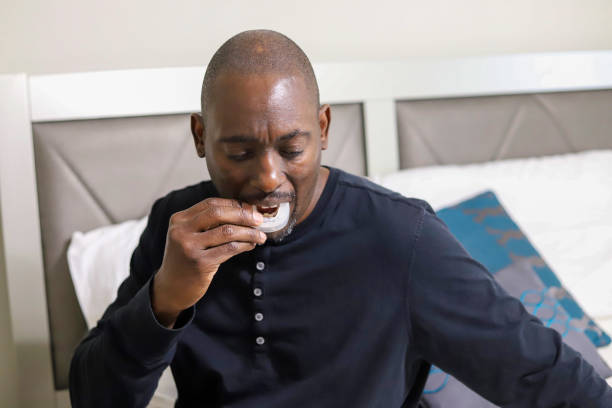A mouthguard is a familiar sight in most sports, but what about while you sleep at night? Wearing a mouthguard to bed can carry numerous benefits for your overall health, but especially your dental health. Three key benefits of wearing this appliance overnight include bringing
- A Halt To Teeth Grinding
- A Solution For Snoring
- Relief From Jaw Pain and Jaw Clenching
Wearing a mouthguard while you sleep at night has excellent benefits, however, it isn’t for everyone. According to a few studies, a mouthguard might not resolve these symptoms or can make them worse if it’s not customized.

The Importance of a Properly Fitted Mouthguard
Not all mouthguards are created equal. A custom-fitted mouthguard, designed specifically for your teeth and jaw, offers the best protection and comfort. Generic, over-the-counter guards may not fit well, leading to discomfort and aggravated jaw pain. It’s crucial to consult with a dental professional to ensure your mouthguard fits perfectly, ensuring effectiveness and comfort.
Can Wearing A Mouthguard Cause Dry Mouth Or Headaches?
Similar to a pair of metal braces, it will take some time for you to adjust to a mouthguard that you wear overnight. The glands in your mouth responsible for saliva production can either kick into overdrive or become suppressed while you sleep. Not everyone wearing a new mouthguard will face issues with dry mouth or excessive saliva when they sleep, but this device can cause these side effects.
If you’re experiencing jaw pain, then you should know that it’s also possible for headaches to occur with your new mouthguard. Keep in mind that this could be attributed to an improper fit, lack of sleep, or the adjustment period of wearing a new mouthguard.
Headaches can be concerning, especially if they occur each night or the following morning as a result of mouthguard wear. You should speak with your doctor or dentist for guidance on mouthguard wear and to address any additional health concerns that occur.
Alternatives to Wearing a Night Guard for Dental Protection
While wearing a night guard is a common and effective solution for protecting your teeth and jaw muscles from the effects of grinding and clenching, some people may find it uncomfortable or prefer alternative methods. Here are several approaches to consider if you’re looking for different ways to protect yourself:
- Stress Management: Often, the root cause of teeth grinding, known as bruxism, is stress. Engaging in stress-reducing activities such as yoga, meditation, or even regular exercise can help relax your jaw muscles and reduce the need to clench or grind your teeth.
- Conscious Jaw Relaxation: Throughout the day, make a conscious effort to keep your jaw relaxed. Place the tip of your tongue between your teeth; this practice trains your jaw muscles to stay relaxed and helps reduce the habit of clenching your teeth.
- Massage and Physical Therapy: Regular massage or physical therapy can be effective in relieving tension in the jaw muscles. This can be particularly beneficial for those with TMJ disorder, as it helps to ease muscle stiffness and reduce teeth grinding.
- Dietary Changes: Avoiding hard or chewy foods can reduce strain on your jaw muscles. This is especially important if you’re experiencing tooth sensitivity or pain due to excessive grinding. Opt for softer foods and give your jaw a break.
- Warm Compress: Applying a warm compress to the jaw area can help relax the jaw muscles, reducing the urge to clench or grind your teeth. This can be particularly soothing before bedtime.
- Behavioral Strategies: Cognitive behavioral therapy (CBT) and other behavioral strategies can be effective in changing the habits associated with teeth grinding. These techniques focus on altering behavior through relaxation training and stress management.
- Botox Injections: In some cases, Botox injections are used as a treatment to prevent teeth grinding. By temporarily relaxing the jaw muscles, Botox can reduce the symptoms associated with grinding and clenching.
- Mouth Exercises: Performing specific mouth exercises can strengthen the jaw and help reduce the unconscious movement of teeth grinding and clenching. Consult with a dental professional for exercises tailored to your needs.
- Acupuncture: Some find relief from bruxism through acupuncture, as it can help in managing stress and muscle tension.
- Monitoring Tooth Wear: Regular dental check-ups are important to monitor tooth enamel wear and tear. Your dentist can provide advice, examine underlying dental issues, and provide treatment options if they notice signs of excessive grinding.
While wearing a dental night guard is a widely recommended solution, exploring these alternatives can potentially offer relief as well. Whether you’re on the fence about wearing a mouthguard or not, you should speak with a dentist before you make any decisions.
Address Snoring & Sleep Apnea With Brian Homann, DDS
If you’ve been recently diagnosed with sleep apnea or experience dreadful snoring problems, then our team might have a solution, which resembles a mouth guard, that could help. At Brian Homann, DDS, our practice can work directly with your physician to create a comfortable, anti-snoring device that can bring you some relief.
Contact us today to schedule an appointment or learn more about how our team can address your snoring or sleep apnea problems.

